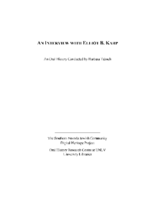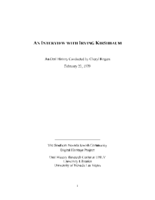Search the Special Collections and Archives Portal
Search Results

Transcript of interview with Thelma Coblentz by Judith Chavez, February 17, 1980
Date
Archival Collection
Description
On February 17, 1980, Judith Chavez interviewed Thelma Coblentz (born 1911 in New Jersey) about her experiences in Southern Nevada. Coblentz first talks about her move to Lovelock, Nevada, where her husband provided medical care as one of the first physicians in the small town. She later talks about her move to Las Vegas and some of the services she helped to provide at Nellis Air Force Base. Coblentz later describes Downtown Las Vegas, specifically the development of the casinos and shopping businesses. She later talks about the rainstorms and dust storms that the city would experience before recalling some of the entertainers who would perform on the Las Vegas Strip. The interview concludes with a discussion on the first physicians in Las Vegas and the increasing population of the city.
Text

Transcript of interview with John and Mabel Dillingham by Sonny Le Jeune, March 19, 1978
Date
Archival Collection
Description
On March 19, 1978, John (Sonny) Le Jeune interviewed John (born 1904 in Trail Creek, Idaho) and Mabel Dillingham. The two provide many historical accounts of Las Vegas, Nevada, including John’s work on the railroad, the development of the city, and their living conditions when first moving to Las Vegas. The three also discuss prominent members of the community, recreational activities, church membership, and popular attractions around Las Vegas. Other topics include the building of Hoover Dam, the site of the Stewart Ranch, early irrigation systems, flood control, and Block 16.
Text

Transcript of interview with Ike Lawrence Epstein by Barbara Tabach, August 24, 2017 and February 2, 2018
Date
Archival Collection
Description
Ike Lawrence Epstein’s office at the recently opened UFC headquarters is sunlit and handsomely decorated. A black and white photo taken by the famous British photographer David Bailey of the Kray brother adorns the wall. Lawrence, as everyone knows him, is the son of Kenny Epstein and Donna Goldstein. He was born, in 1966, and raised in Las Vegas. He attended Vanderbilt University (BA 1989, JD 1992) and then returned to live full time in Las Vegas with his law degree in hand. In addition to being COO of the UFC, he is active in the family business, the El Cortez Hotel and Casino. In this oral history, Lawrence recalls his grandparents, their careers in Las Vegas, and his youthful favorite holidays being Passover and Thanksgiving. He became a bar mitzvah in Israel, a tradition he continues with his own children with Michelle Epstein. Lawrence serves the community as a board member of Meadows School and on the Stadium Board. As an executive with UFC [Ultimate Fighting Championship], Lawrence observes the overall magnitude of sports in Las Vegas in 2017, how it came to this point with professional sports, and what he envisions as the future possibilities of the city as an international sports destination.
Text

Transcript of interview with Wilma and Burt Bass by Barbara Tabach, February 9 , 2015
Date
Archival Collection
Description
In 1939, Wilma (Frank) Bass was born in New York City, where she began her involvement in theater at the age of ten. Almost twenty years later, she met Burt Bass (1932- ) when both worked for a photography studio, one of Burt first post-high school jobs. Burt opened his first professional photography studio in 1962, shortly after he married Wilma in 1960. The couple soon had two daughters – Jill and Wendy – and moved to Las Vegas in 1974. Burt initially worked for his brother-in-law Ed Frank's check cashing businesses and later opened his own photography business, Burton Studio. He later added services such as fingerprinting, background checks, and photographs for identification cards. Wilma worked as a jewelry salesperson, first at the Gold Factory then at Nieman Marcus. Socially, she was very involved with Temple Beth Sholom’s Sisterhood, using her theater talents to write, direct and produce various shows for the Sisterhood, ORT as well as B’nai B’rith Youth Organization. In this interview, Burt discusses his photography business, the migration of its storefront around town, and his colorful landlords, including individuals like Moe Dalitz and Art Marshall. Wilma talks about her sales career in the local jewelry industry, and more extensively, she shares memories of her involvement in the Jewish community with theater productions. Much of the discussion revolved around related news articles and personal photos from their relationships and activities within the Jewish community. The couple also shares stories of friendships with local entertainers, including Jerry Lewis and Neil Sedaka.
Text

Transcript of interview with Gene Greenberg by Barbara Tabach, February 12, 2015
Date
Archival Collection
Description
In 1976, Gene Greenberg decided to accept a job transfer with Donrey Media Group and relocated from Laredo, Texas to Las Vegas. Las Vegas was comfortable fit and for the next 30 years, he primarily worked in television ad sales. He rose to become executive vice president and general manager of KVBC-TV. Significant to Gene’s ties to Las Vegas have been his ties to the Jewish community. This oral history includes reminiscences of connecting with the Jewish community and meeting many of the Jewish leaders through Young Leadership, Jewish Federation, and being on the board for Temple Beth Sholom. The most poignant aspect to his Jewish roots is the survival of both his parents during Holocaust. Both Helen and Abe Greenberg were from Lodz, Poland and interred in concentration camps. Gene is a frequent presenter of their story for his commitment to Holocaust education and as a member of the next generation. Gene and his wife Melanie both spent their childhoods in Kansas City, Missouri and are graduates of the University of Missouri-Kansas City. They married in 1970 and have three children: Sari Mann, Elissa Burda, and Jaron Greenberg.
Text

James L. Hogan interview, March 11, 1978: transcript
Date
Archival Collection
Description
On March 11, 1978, collector Patty L. Baratti interviewed James Hogan (born April 6th, 1909 in Winton Place, Ohio) at his home in Las Vegas, Nevada. In this interview, Hogan talks about his time working with the telephone company in Arizona and moving to Las Vegas, Nevada. He discusses his time working on grazing rights and cattle ranching in Nevada and how planning went to ensure that farms were able to have land to graze their animals. He speaks about dealing with farmers, corporations, and the government and the frustrations he had to deal with before there were set laws about grazing. He also discusses the change from mainly family farms in Nevada to corporations owning much of the farmland.
Text

Transcript of interview with Marie Horseley by Suzanne Becker, June 13, 2007
Date
Archival Collection
Description
Twenty years after her birth in Utah in 1924, Marie Horseley met and married her husband who was an engineer for the Union Pacific Railroad. They settled in Las Vegas, his home town and soon purchased a home for $9800 in the new John S. Park neighborhood. Sixty years later Marie, twice a widow, remains in the home. Up the street four doors, one of her granddaughters lives with her three children. Marie recalls the new housing development that appealed to railroad workers. The roads were dirt and there were no streetlights, but soon a community blossomed. Marie is a self-described quiet resident; her life was about raising her three daughters and being a member of the LDS church. However, she knew everyone on her street no matter their religious affiliation. Today the businesses are gone. Homes have changed appearances over the years as owners have changed. Ethnic diversity is apparent and the sense of community closeness has slipped away for her. Yet she loves her place there, feels safe and secure. When asked about the ides of John S. Park being designated a historic district, she is not all that wowed by the idea of restrictions that might be included in that. Nevertheless, she has no intention of relocating from the comfort of the place she has called home all these years.
Text

Transcript of interview with Robert D. "Bob" Fisher by Barbara Tabach, January 8, 2015
Date
Archival Collection
Description
Robert D. "Bob" Fisher is a Las Vegas, Nevada broadcast personality and lobbyist. He was born in Minneapolis, Minnesota and moved to Las Vegas in 1994 when he was hired to be the founding president and CEO of the Nevada Broadcasters Association (NVBA). During his 22 years as head of the NVBA, he produced and hosted Observations, a public affairs program broadcasted on radio and television throughout the state of Nevada. Soon after, he began producing and hosting the only weekly live television program about diabetes in the United States; in 2015 his weekly live radio program The Diabetes Show was the only one of its kind to be aired over commercial radio in the U.S. Fisher helped bring the AMBER Alert program to Nevada in 2003, and served as its chairman and coordinator for ten years. His other lobbying successes include the classification of certified broadcasters as First Responders and the elimination of Broadcaster Non-Compete contracts in 2013. He served on the Nevada Homeland Security Commission for 13 years, the Nevada Crime Commission, and the Governor's Defense Base Closure and Realignment Commission. Fisher is a founding clergy member of Midbar Kodesh Temple in Henderson, Nevada and served as its cantor for over a decade. After his retirement from NVBA at the end of 2014, he established Bob Fisher Weddings to provide his services as a wedding officiant. In this interview, conducted shortly after his retirement from NVBA, Fisher discusses his childhood in Twin Cities, and the large role Judaism played in his upbringing. He speaks at length about his involvement with United Synagogue of Conservative Judaism over the years, including as regional director of the United Synagogue Youth Far West Region, which took him from Minnesota to California. He talks about his time in Los Angeles, and later, about his life in Las Vegas, including his broadcasting career as well as involvement with Midbar Kodesh Temple.
Text

Transcript of interview with Elliot B. Karp by Barbara Tabach, December 17, 2014
Date
Archival Collection
Description
Interview with Elliot B. Karp by Barbara Tabach on December 17, 2014. In this interview, Elliot Karp discusses growing up in a culturally Jewish household in New York and becoming more observant in his teenage and college years. He decided, after a trip to Israel and a year in a rabbinical program, that he wanted to be a "Jewish professional" with a focus on social work and community organizing, and attended a Master's program at Brandeis University. Karp goes on to talk about his work for the Jewish Federation in Ohio and Pennsylvania, and being recruited to come to Las Vegas. He talks about the challenges in the Las Vegas Jewish community and the Jewish Federation's role as an umbrella organization to partner with other agencies to grow and sustain a robust Jewish community in Southern Nevada.
On October 6, 1955, Elliot Karp was born in Mineola, New York to parents of East European heritage who identified as culturally Jewish. As a teenager, Elliot felt the calling to become kosher, balancing this practice with household norms that were not as strict. He eventually became shomer Shabbat just after enrolling at State University of New York at Stony Brook, where he majored in Political Science. After graduating from SUNY, Elliot spent a year living in Israel considering a path in rabbinical studies. By the end of his time, he decided on a different, yet related path, and registered as a graduate student in Brandeis University's School of Jewish Communal Service, on fellowship from Council of Jewish Federations. After graduating, Elliot moved to Columbus, Ohio to work for the Jewish Federation, focusing on fundraising, but was exposed to many different operational areas of the organization. After three years, Elliot was recruited to the Philadelphia office as its director of leadership development. He then left the Federation to work in development at Brandeis University, but after two years, returned to the Federation as the Cincinnati office's chief development officer. In 2008, Elliot received a call to take his highly cultivated leadership and fundraising skills to another Federation office: Las Vegas. After much consideration, he took the job - and challenge - as the office's new chief executive officer. Since then, Elliot has done much to promote communication, coordination and collaboration within the local Jewish community and beyond, through relationship building and successful fundraising efforts. His ultimate desire is to expand funding for programs that get more people involved in Jewish life - while also empowering community members define what a Jewish life means for them.
Text

Transcript of interview with Irving Kirshbaum by Cheryl Rogers, February 23, 1979
Date
Archival Collection
Description
Interview with Irving Kirshbaum by Cheryl Rogers on February 23, 1979. In this interview, Kirshbaum discusses the Riviera Hotel where he began working in 1955. He also talks about the landscape of the Las Vegas Strip in the 1950s, and the state of gambling, comps, customer service, and dealer training. The interviewer asks about the treatment of minorities at the Riviera, and in Las Vegas generally, and the effect of corporate ownership on casinos.
Text
